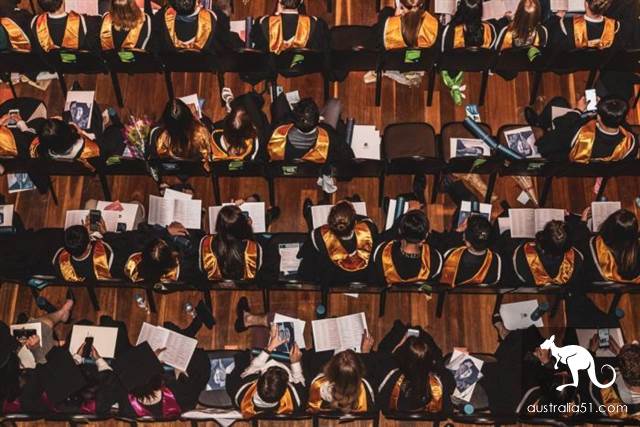
Chinese students account for about 1% of the total number of students in Australian universities. (picture of Australian Broadcasting Corporation)
According to a new report from the SBS, Sydney Morning Herald and the Australian Broadcasting Corporation, (Centre for Independent Studies, an independent Think Tank independent research center in Australia, says at least seven major Australian universities rely heavily on Chinese students for their income, posing a risk of financial crisis for the institutions concerned. In addition, Australia`s top universities are using some "backdoor" preparatory courses to lower English standards for overseas enrollment.
10% of the students are from China
The report, released today, points out that the cost of courses for Chinese students accounts for 13 to 23 percent of the total annual income of the universities concerned. Barbs (Salvatore Babones), a sociologist at the University of Sydney and a researcher at CIS, told SBS that the problem was not that the students were Chinese, but that they were "overrepresented."
``It`s good to have foreign students. The problem is that you have so many foreign students that your financial viability depends on them. ``
The report found that about 1/4 of all students in Australian universities are studying abroad, and about 10% of them come from China.
In 2017, Chinese students at the University of Sydney paid a total of A $500m, accounting for 1/5 of the university`s total annual income, topping the list of Australian universities. "at the University of Sydney, one out of every 10 students is from China. For a university, this is an unusual number," Barbos said.
He also said that the University of Melbourne, the Australian National University, the University of New South Wales, the Sydney University of Science and Technology, the University of Adelaide and the University of Queensland are all studying in China.
Barbos points out that there is a risk that these large groups of students may leave in large numbers for political, reputation or economic reasons. "We see a trade war between the United States and China, which puts a lot of pressure on China`s economic and the yuan. When Chinese students get caught off guard, it will backfire on Australian universities."
Is the threshold for foreign students lower?
A number of institutions, including the University of Melbourne, the University of Sydney and the University of New South Wales, are compromise on English standards for foreign students, preferred to "risk huge financial risks in chasing the bucket of gold," the Independent Research Center said.
Barbos called on principals to raise enrollment standards as soon as possible and reduce international students to reduce their vulnerability to sudden income crises.
In order to ensure the income of foreign students, many Australian colleges and universities open up the way for students who do not meet the IELTS (IELTS) standard to enroll in expensive preparatory courses. Some schools have lowered their admission requirements, while others have guaranteed them admission.
Of these, the University of Sydney requires IELTS to reach 6.5 or 7 points, although the A $34000 preparatory course offered by (Taylors College), which is half-owned by Thales College, requires only five points for IELTS. Mr. Barbos said 95 percent of its students had received admission notices, according to advertisements at the college.
A similar bridge program at the national university of australia, according to the report, also received five-minute IELTS students and promised to get the Australian National University`s acadmaic deree, as long as they get a 60% score.
But universities have dismissed the argument, saying they have been demanding a higher level of English.
At the same time, the University of Melbourne offers a preparatory course (Foundation Program). For students who do not meet the admission requirements. The school`s website also guarantees substandard international students that there are other ways to get academic degree.
In an interview with the Sydney Morning Herald, Barbos said the preparatory course is a regular bomb buried in Australian higher education. Although colleges and universities do not publish data on preparatory courses or on the ability of foreign students to respond to English requirements after entering college, Barbos says many people are struggling, for example, that some of his Chinese students do not even understand the homework requirements they give, and that many of them have difficulty speaking English and are unable to participate in the discussion.
Education minister denies
Tiehan (Dan Tehan), the education minister, disagreed with the report that the Australian education industry is overly dependent on Chinese students and said the financial situation of Australian universities was "and stable."
In an interview with ABC Radio, Tiehan said the report did not put the income generated by Chinese students in the real context, saying the seven institutions had a total net surplus of A $930 billion.
In one context, he said, the seven schools had a net surplus of $930 billion. "they know what needs to be done to ensure the future of their universities. They are in good financial condition and have excellent financial management."

